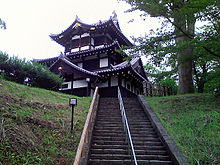Takada Castle
| Takada-jō | |
|---|---|
| Jōetsu | |
 Corner tower of Takada (Reconstructed) | |
| Coordinates | 37°06′36″N 138°15′21″E / 37.11°N 138.255833°E |
| Type | Hirajiro (lowland castle) |
| Code | JP-15 |
| Site information | |
| Condition | Earth walls and ditches etc preserved |
| Site history | |
| Built | 1614 |



Takada Castle (jap. 高田城, Takada-jō) is a Japanese castle in Jōetsu in Niigata Prefecture in Japan.
History
Matsudaira Tadateru began construction of the castle in 1614 under the authority of the Tokugawa shogunate. Thirteen Daimyō were involved in the its construction, which was organised by Date Masamune, Tadateru's father-in-law. Even Daimyō Uesugi Kagekatsu who resided in Yonezawa and Maeda Toshitsune, Prince of Kanazawa, were involved in the construction. The location chosen for the castle was in a loop of the Seki river in the plain of Bodaigahara (菩提ヶ原).
Construction of the castle was begun on 15 March 1614 and was more or less completed only four months later. That the castle, which including the outer ditches covered more than 60 hectares, was completed so quickly derives from the fact that it had only earthwork walls and no donjon (Tenshukaku). One of the corner towers (yagura) near the main gate was expanded to three-stories tall in order to fulfill the role instead. The reason for these austerities was that in 1614 the Shogunate was preparing for the Siege of Osaka and had to concentrate its resources.
By the 1620s, the castle was complete, but in 1665 it suffered serious earthquake damage. In 1751 it was again damaged by an earthquake and in 1802 all the buildings except the gates and corner towers were destroyed by fire.
After the Meiji Restoration all the buildings were lost to fire or disrepair. In the context of the 20th anniversary celebrations of the city of Jōetsu (1991) it was decided that the corner tower should be rebuilt in its original form, using old plans. The castle is well known for its cherry blossom.
List of Daimyō
- 1614 Matsudaira Tadateru (600,000 Koku income)
- 1616 Sakai Ietsugu (100,000 Koku)
- 1619 Matsudaira Tadamasa (250,000 Koku)
- 1624 Matsudaira Mitsunaga (260,000 Koku) until 1681, when the domain was confiscated and abolished until 1685.
- 1685 Inaba Masamichi (102,000 Koku)
- 1701 Toda Tadazane (67,000 Koku)
- 1710 Matsudaira (Hisamatsu) Sadashige and descendents (110,000 Koku)
- 1741 Sakakibara Masanaga and descendents (150,000 Koku)
- Masataka (1843–1927) was the last Daimyō of this family. From the Meiji period, the heads of the household had the title of Viscount.
Bibliography
- Ikeda Koichi, Takada-jo in: Miura Masayuki (Ed.), Shiro to jinya. Tokoku-hen. Gakken, 2006. ISBN 978-4-05-604378-5.
- Miyaji Saichiro (Ed.), Takada-jo in Bakumatsu shoshu saigo-no hanshu-tachi. Higashinihon-hen. Jinbunsha, 1997. ISBN 978-4-7959-1905-1.
- Niigata-ken no rekishi sampo henshu iinkai (Ed.): Niigata-ken no rekishi sampo. Yamakawa Shuppan, 2009. ISBN 978-4-634-24615-7.

